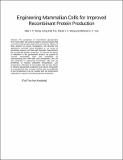| dc.contributor.author | Wong, Niki S.C. | |
| dc.contributor.author | Tan, Hong-Kiat | |
| dc.contributor.author | Wang, Daniel I.C. | |
| dc.contributor.author | Yap, Miranda G.S. | |
| dc.date.accessioned | 2003-12-08T15:17:15Z | |
| dc.date.available | 2003-12-08T15:17:15Z | |
| dc.date.issued | 2003-01 | |
| dc.identifier.uri | http://hdl.handle.net/1721.1/3781 | |
| dc.description.abstract | The production of recombinant glycoproteins from mammalian cell cultures requires robust processes that can achieve high protein yield while ensuring the efficacy of these proteins as human therapeutics. We describe two approaches currently being developed in our group to genetically engineer cell lines with desirable characteristics for recombinant protein production. To enhance the degree of sialylation in the glycoprotein product, we propose to increase intracellular sialic acid availability by overexpressing the CMP-sialic acid transporters. We are also interested in engineering mammalian cells that can proliferate at reduced cultivation temperatures. Low temperature cultivation of mammalian cells has been shown to enhance glycoprotein production but reduces cell growth. It is hypothesized that a mutant cell line that can proliferate at low temperatures may be coupled with low temperature cultivation to improve recombinant protein production. | en |
| dc.description.sponsorship | Singapore-MIT Alliance (SMA) | en |
| dc.format.extent | 11114 bytes | |
| dc.format.mimetype | application/pdf | |
| dc.language.iso | en_US | |
| dc.relation.ispartofseries | Molecular Engineering of Biological and Chemical Systems (MEBCS); | |
| dc.subject | recombinant glycoproteins | en |
| dc.subject | recombinant protein production | en |
| dc.subject | sialylation | en |
| dc.subject | CMP-sialic acid transporters | en |
| dc.title | Engineering Mammalian Cells for Improved Recombinant Protein Production | en |
| dc.type | Article | en |

